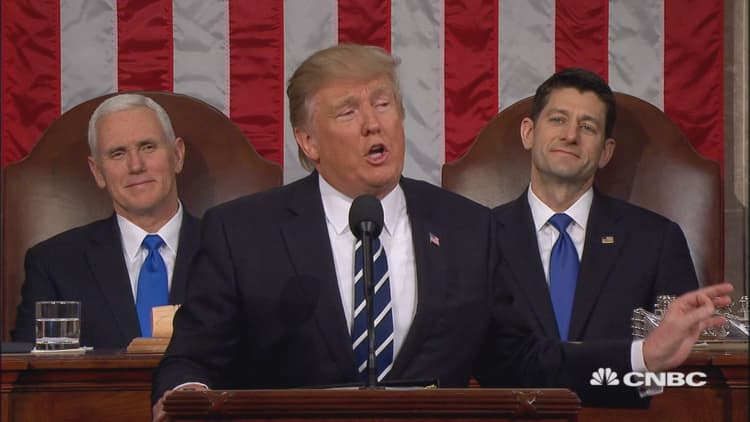
House Republicans in their planned replacement for Obamacare want health savings accounts to play a larger role in how Americans pay for health care.
Provisions of the newly unveiled American Health Care Act will nearly double the contribution limits for health savings accounts and give people more flexibility in how they can spend money in these tax-advantaged accounts.
Congress' Joint Committee on Taxation estimates the provisions for expanding health savings accounts will cost $19 billion through 2026. The committee puts the total 10-year cost of repealing the Affordable Care Act, more commonly known as Obamacare, at $594 billion because the GOP plan repeals taxes on high earners that partially pay for the law.
These estimates do not include the cost of repealing the individual and employer mandates or the cost of the replacement tax credits in the House GOP plan, according to the Committee for a Responsible Federal Budget, a nonpartisan fiscal watchdog.
HSAs, introduced in 2003, offer you triple tax advantages: First, contributions are tax-deductible. Second, those contributions can be invested and grow tax-free. Third, withdrawals aren't taxed as long as you use them for qualified medical expenses, such as doctor's visits, prescription
For older account holders, you can use your HSA to pay for Medicare premiums and out-of-pocket expenses including deductibles,
If you use an HSA to pay for unqualified medical expenses, the tax penalty is 20 percent, unless you are 65 or older. At that age, you can take money out for whatever you want, but the withdrawals will still be subject to regular income taxes.
A drawback of HSAs is that currently they must be paired with a high-deductible health plan. Such a plan means you'll have to pay a deductible of at least $1,300 for individual coverage and $2,600 for families. The maximum annual out-of-pocket costs for these plans are $6,550 for individuals and $13,100 for families.
In 2017, you (and your employer) can contribute up to $3,400 to an HSA for individuals and $6,750 for families. Account holders age 55 and older can contribute an extra $1,000.
The House GOP bill will increase the annual limit on HSA contributions to match the annual deductible and out-of-pocket expenses under a high deductible health plan. That means the HSA contribution limit could be at least $6,550 for individuals and $13,100 for families beginning next year.
The American Health Care Act also makes HSA rules more flexible by:
- Allowing both spouses to make catch-up contributions to one HSA beginning in 2018.
- Permitting qualified medical expenses incurred before HSA-qualified coverage begins to be reimbursed from an HSA as long as the account is established within 60 days.
- Letting people use their HSAs to pay for over-the-counter medications, which was restricted under Obamacare.
If approved by the House, the bill would still need to pass the Senate, which has a slimmer Republican majority and no consensus on an Obamacare replacement plan. Republican Sens. Bill Cassidy of Louisiana and Susan Collins of Maine have introduced a bill to create Roth HSAs (funded with after-tax dollars) to help people pay health insurance premiums and out-of-pocket costs.
Health savings accounts continue to grow
Health savings accounts have grown to an estimated $37 billion in assets and 20 million accounts at the end of last year and reached $41 billion in assets during January, according to Devenir, an HSA consulting firm in Minneapolis.
Given the momentum, Devenir forecasts assets in the accounts could reach more than $53 billion by 2018, a 20 percent increase from 2017. (See chart below.)
Depending on if and how lawmakers replace the Affordable Care Act, the impact of HSAs could be more substantial.
Under a Republican heath-care regime, HSAs could become central to people's financial lives with account holders using them to fund health and long-term care insurance as well as deductibles, according to a recent report from Bill Limburg, a senior associate at management consulting firm Patpatia & Associates in San Francisco.
Limburg estimates HSAs could easily reach $435 billion by 2021 as up to 25 million people open accounts under an Obamacare replacement.
To be sure, more HSAs could mean that most Americans will likely pay for a larger share of their expenses with these tax-advantaged accounts than they do under the current system.
More from Your Money Your Future:
Labor Department proposes 60-day delay for investor protection rule
Obamacare possible repeal may birth a new retirement account
These excuses won't save you taxes, the IRS had heard them all before
How to pick an HSA
You don't have to wait on Congress or President Donald Trump to open an HSA.
Unlike flexible spending accounts, you don't have to "use it or lose it" with an HSA each year. In fact, more than three-quarters of HSA account holders withdrew less than they contributed, and 24 percent didn't touch any money from their accounts, according to a 2015 Fidelity Investments analysis of the more than 500,000 accounts it administers.
Devenir estimates that about 10 percent of the roughly 20 million HSA account holders have a balance of $5,000 or more and 4 percent of people are using their HSAs as investment plans.
Your employer may direct you to sign up with its preferred HSA provider, but if you are enrolled in a qualified high-deductible health plan, you can choose whatever provider you want. However, if employers only offer matching HSA contributions to their preferred provider, it makes sense to stick with them.
HSAs can travel with you if you change jobs or insurers. Just like with any retirement account,
Use HSASearch, which is run by Devenir, to comparison-shop for more than 320 providers. Most HSAs will require that you have at least $1,000 in the account before you can begin putting money into investing options, such as stock and bond funds.
This story has been updated with cost estimates for the HSA expansion from Congress' Joint Committee on Taxation.






